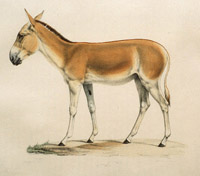
Erforschung biologischer Ressourcen der Mongolei / Exploration into the Biological Resources of Mongolia, ISSN 0440-1298
Date of this Version
2012
Document Type
Article
Citation
Erforschung biologischer Ressourcen der Mongolei (2012) band 12: 7-12.
Abstract
First two paragraphs:
In 2012 we celebrate the 50th anniversary of the Mongolian-German Biological Expeditions. The roots can be found in the old German-Russian scientific relationships in the history of the University Halle-Wittenberg in connection with August Hermann Francke (1663–1727) and his Foundations (founded in 1698). It’s a long tradition, dating back to the 18th century when early researchers as Georg Wilhelm Steller (1709 –1746) or Peter Simon Pallas (1741–1811) reached the northern border of Mongolia. Other sources of close connections between Halle and Russia are given by persons as the physician Friedrich Hoffmann (1660–1742), the mathematician Christian Wolff (1679-1754) and the botanists Alexander Bunge (1803–1890) and Dietrich Franz Leonhard von Schlechtendal (1794–1866). Peter the Great (1672–1725) founded in 1724 in Petersburg the “Academy of Sciences and Arts”, which was organizing expeditions in all parts of the Russian empire. The physician Laurentius Blumentrost (1692–1755), who has studied in Halle, Oxford, the Netherlands and Paris, was appointed as the first president. Peter I and Katharina II (1729–1796) (princess of Anhalt-Zerbst, not far from Halle) have supported the exploration of Siberia and the Far East decisively.
In the 19th century up to the middle of the 20th century, Central Asia was in the focus of famous Russian, Swedish and American explorers. We have to add that Sven Hedin (1865–1952), one of the well known explorers of Central Asia, has written his dissertation at our Alma mater. From these first steps of exploration of Mongolia we will do a great jump forward to the second half of the 20th century. In 1942 the University of Ulaanbaatar and in 1961 the Mongolian Academy of Sciences were founded. That was the beginning of a long and hard way of independent development of Mongolian Sciences. German and especially Russian scientists accompanied this successful way of education and formation of Mongolian sciences.
Included in
Asian Studies Commons, Biodiversity Commons, Environmental Sciences Commons, Nature and Society Relations Commons, Other Animal Sciences Commons


Comments
Copyright 2012, Martin-Luther-Universität Halle Wittenberg, Halle (Saale). Used by permission.